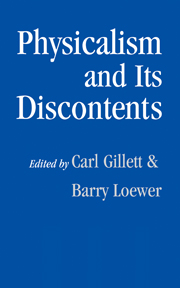Book contents
- Frontmatter
- Contents
- Contributors
- Preface
- Part I Physicalism
- 1 The Rise of Physicalism
- 2 From Physics to Physicalism
- 3 Sufficiency Claims and Physicalism: A Formulation
- 4 Realization and Mental Causation
- 5 Physicalism and Psychology: A Plea for a Substantive Philosophy of Mind
- 6 Davidson and Nonreductive Materialism: A Tale of Two Cultures
- 7 Substance Physicalism
- 8 Possibility: Physical and Metaphysical
- Part II Physicalist Discontents
- Part III Physicalism and Consciousness: A Continuing Dialectic
- References
- Index
2 - From Physics to Physicalism
Published online by Cambridge University Press: 02 November 2009
- Frontmatter
- Contents
- Contributors
- Preface
- Part I Physicalism
- 1 The Rise of Physicalism
- 2 From Physics to Physicalism
- 3 Sufficiency Claims and Physicalism: A Formulation
- 4 Realization and Mental Causation
- 5 Physicalism and Psychology: A Plea for a Substantive Philosophy of Mind
- 6 Davidson and Nonreductive Materialism: A Tale of Two Cultures
- 7 Substance Physicalism
- 8 Possibility: Physical and Metaphysical
- Part II Physicalist Discontents
- Part III Physicalism and Consciousness: A Continuing Dialectic
- References
- Index
Summary
Introduction
Hilary Putnam explains that:
The appeal of materialism lies precisely in this, in its claim to be natural metaphysics within the bounds of science. That a doctrine which promises to gratify our ambition (to know the noumenal) and our caution (not to be unscientific) should have great appeal is hardly something to be wondered at. (Putnam [1983], p. 210)
Materialism says that all facts, in particular all mental facts, obtain in virtue of the spatiotemporal distribution, and properties, of matter. It was, as Putnam says, “metaphysics within the bounds of science,” but only so long as science was thought to say that the world is made out of matter. In this century physicists have learned that there is more in the world than matter and, in any case, matter isn't quite what it seemed to be. For this reason many philosophers who think that metaphysics should be informed by science advocate physicalism in place of materialism. Physicalism claims that all facts obtain in virtue of the distribution of the fundamental entities and properties – whatever they turn out to be – of completed fundamental physics.
The enterprise of fundamental physics can be characterized (perhaps a little tendentiously) in terms of its ambition and the kinds of concepts it employs in attempting to satisfy that ambition. The goal of physics is, first, to discover the laws that govern or describe the motions of macroscopic material objects; and second, to discover laws that are complete in that they completely account for every event mentioned by those laws.
- Type
- Chapter
- Information
- Physicalism and its Discontents , pp. 37 - 56Publisher: Cambridge University PressPrint publication year: 2001
- 34
- Cited by



